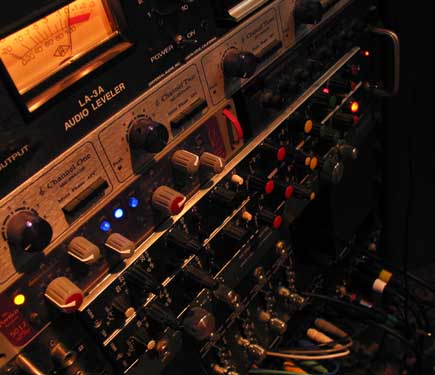
One thing can open or close the door on the dream to stardom.
When dreaming, inspiring musicians are probably playing their song in front of millions of people, but to get there, they first have to go through the task of trying to get recorded.
Among college students it seems that the number of musicians trying to make it in the industry is rising. A few years ago most people were content with performing at small venues. But with the new, overwhelming interest in fame, more people are trying to make it big.
“Everybody wants to be famous,” said Terry Stroud, Chief Operating officer for the In Your Ear Music recording studio in
Many believe that actually getting the music recorded will help in the search for fame. After bands record, they have a better means of producing and distributing their music to people of authority and without.
But before a band may start recording they have to show that they are serious about their work. In Your Ear Music, said they receive may calls, but not many musicians come in to record.
“You have to find out if they really have the work ethnic to be able to do what it takes to be in the biss. This is not simple work and they have to have the talent in order to do the writing and know what to do in the studio and how to make it work,” said Stroud.
When talking about talent and what can help new musicians on the come up, Stroud says music lessons. He feels that a more structured learning for music will help more than networking and learning from peers.
“I think they need to have a more structured learning sort of thing for music its self, and for computers, and some other things like that. So they’ll really have an idea technically at least on a particular level what it is they are doing in the studio and why that works,” said Stroud.
The knowledge of some academic education is also a plus to Stroud when it comes to the actual recording process of music. Who believes basement recording doesn’t match up to the real thing.
“A lot of time they just buy a computer, buy an Apple computer and they work in their basement for six months and their a video editor or a audio engineer. But that is not even close to it. They have to know how to run a computer but they don’t understand technical things, they don’t understand physics and stuff,” said Stroud.
But Victor “DJ Mase” Mason would probably disagree since he records other artist and his own music in a “home” studio.
“The home studio, you can make it good quality just as if you were in a studio if you have the right person behind the boards, mixing and mixing down the tracks. To me it’s all about what kind of mic you have, what kind of filter you have in front of the mic and then the rapper themselves, how clear they are,” said Mason.
Another reason bands may considering basement recording over professional recording is the cost. It is a lot cheaper, and sometimes free to record this way. And with the bad economy and the rising tuition cost, this method is a favorite among many student musicians.
“It’s a lot cheaper and more affordable. I mean in this day and age, I’m not saying you need to go cheaper with everything but if you can save money and come out with a product that is equally as great, at least quality wise. I don’t know why you wouldn’t do it,” said Mason.
But they one thing that both Mason and Stroud agrees on is that they have to have a love and a passion for music and what they do There also has to be a strong degree of dedication to their working and getting it right, and if they don’t Stroud said “it shows.”

No comments:
Post a Comment